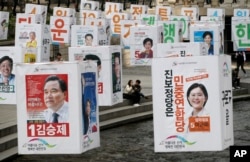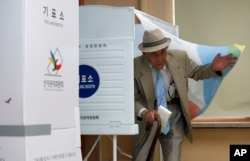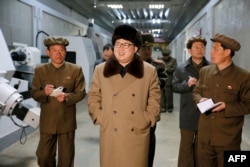For the first time in 16 years, a South Korean ruling party has failed to win a majority in a legislative election.
The surprise losses suffered by President Park Geun-hye’s Saenuri Party Wednesday revealed widespread public discontent with her conservative economic policies and growing division over her “get tough” approach to the North Korean nuclear threat.
Saenuri won only 122 out of 300 seats in the South Korean National Assembly according to the National Election Commission. Going into the election, the ruling party was projected to win a clear majority.
In addition to the stronger than expected opposition, Saenuri was also hurt when a number of its candidates defected from the party because the leadership did not back them during the nomination process and they ran as independents.
Taking responsibility for the party’s electoral defeat, Saenuri Party leader Rep. Kim Moo-sung announced his resignation on Thursday.
“We have shown arrogant and shameful acts from the nomination process and could not collect the power of our party and disappointed many people,” he said.
Opposition gains
The main opposition Minjoo Party of Korea won 123 seats in the unicameral parliament. Kim Jong-in, Minjoo’s interim leader, said the vote was a rebuke of Park’s economic policies that produced slow growth of 2.6 percent last year and youth unemployment that reached 12.5 percent in February.
“The Park Geun-hye government and Saenuri party must now realize that the problem was the economy,” he said.
The People’s Party, which split off from Minjoo before the election, won 38 seats, confounding critics who said the division among liberal groups would give conservative candidates a higher percentage of the fragmented field.
The legislative election is also a victory for labor groups that last year organized mass demonstrations to oppose a labor reform bill backed by Park to make it easier for employers to fire workers.
Park was criticized by opponents and human rights groups for denying permits to hold these protest rallies. The police were also accused of using excessive force to break up the demonstrations, and for arresting protest leaders for inciting violence and holding illegal demonstrations.
“We will change the framework of our economy through economic democratization and by embracing growth,” said Minjoo party leader Kim Jong-in.
The Minjoo Party promised to focus on job creation, increasing the minimum wage, increasing pension funds for retirees, and building more affordable housing for younger people. But it is not clear how they propose to pay for these programs.
North Korea
In comparison to the economy, national security concerns seemed to have played a less prominent role in this South Korean election than they did in the past.
In 2012, public anxiety over a North Korean long range missile launch helped the ruling conservative Grand National Party, which later became the Saenuri Party, win a majority in parliament.
During this year’s campaign, the opposition played down their differences with Park’s polices following North Korea’s fourth nuclear test and another long rang rocket launch this year.
Park has been closely aligned with Washington in supporting increased international and unilateral sanctions to pressure the Kim Jong Un government to halt its nuclear program. Public opinion polls had shown strong public support for the government on national security issues.
But the opposition did criticize Park for not being more open to inter-Korean talks and for closing the jointly run Kaesong Industrial Complex, which was the last remnant of South Korea’s Sunshine Policy of engagement with the North.
Some voters voiced concern that Park’s punitive approach has contributed to the heightened tensions on the Korean peninsula and made it more difficult to reach a peaceful resolution.
Pending missile test
Meanwhile, North Korea continues to respond defiantly to international sanctions and pressure by moving forward with developing its nuclear capabilities.
North Korea is reportedly preparing to test, as early as Friday, one or two Musudan mid-range ballistic missiles that could potentially reach U.S. military bases in Guam and Okinawa.
South Korea’s Defense Ministry on Thursday would not confirm if such a missile test is pending, but noted that Friday is the birthday of North Korea’s first leader, Kim Il Sung, and that in the past Pyongyang has marked this day with a demonstration of military might.
Kim Jong Un has claimed to have developed miniaturized nuclear warhead capability and has vowed to conduct further tests of nuclear warheads and ballistic missiles.
Youmi Kim in Seoul contributed to this report.








